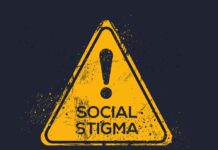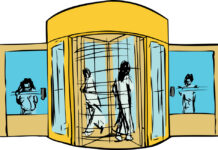Judging from the responses of several readers, certainly not all, to my previous post of March 7, “Poverty & Mental Illness: You Can’t Have One Without the Other,” poverty is not an issue customarily twinned with serious mental illness. Which is not surprising since poverty as a social problem requiring amelioration appears to have dropped off the national agenda. More importantly – and the point of the post – poverty is not usually viewed as a cause of mental illness. Again not surprising, given the predominance of the neurobiological model.
This post is a follow-up to that March 7 post. Unlike the latter, which was chock full of statistics and references, this post will comprise my own unfettered analysis of poverty/serious mental illness, one rooted in my forty-year long experience working in the public mental health system and my day-to-day existence in the U.S. of A. That’s my usual approach, to establish a data-filled context and then fill the gaps between abstract data with my own and others’ real-life experiences. That’s my intent here … to connect the dots!
First off, millions of Americans who presumably have serious mental illnesses live below the U.S. poverty line. It’s just not clear how many individuals actually do. Government statistics and research findings do confirm the co-existence of poverty and serious mental illness and the order of usual precedence — poverty then mental illness — but neither provide comprehensive national indices of their incidence, i.e., how many individuals are both poor and labeled as having serious mental illnesses throughout the country. The stats I referenced in my 3/7 post provided a broad range … anywhere from 3 to 15 million persons 18-64 years of age. Since the overwhelming majority of persons I encountered in New York City’s public mental health system were unmistakably poor – their primary and usually exclusive source of support was via governmental income maintenance programs – I would guess that the true number, particularly if the 3 to 15 million is viewed as a continuum, is probably closer to the higher end. (Just to refresh reader’ memories, three million represents the approximate number of adults with presumed serious mental illnesses who receive SSI; 15 million is the number of adults in the 2010 U.S. Census who identified themselves as having some form of disability.) In any event, pure speculation on my part … but still lots of people!
Secondly and closer to the crux, mental illness, serious or not, is a lousy social construct, with no data to support its validity. That’s not to say that individuals do not have psychotic episodes, wherein they experience what Bental terms “complaints” – hallucinations, cognitive distortions, affective dysregulations. But, along with an increasing number of mental health practitioners and peer/ survivors, I’ve come to think of these episodes, thanks to Bental and his colleagues, as “life experiences” rather than “illnesses”. What sets them off as problematic are their social consequences, principally social marginalization for those who undergo them. Given the inadequate treatment which “persons caught up in the public mental health system” – which is how I prefer to think of persons labeled as having serious mental illnesses – usually receive, and which the social causation research literature predicts, the designation of a group of several million individuals as “mentally ill” plays a social control function in the larger society. Just like poverty … and racism … and all the other –isms.
Double whammy, then, if you’re poor and labeled as mentally ill; triple whammy if you’re a person of color, as are most of the folks in the public mental health system in New York City and most other urban centers in the U.S. Viewed systemically, poor folks, whether mentally ill or not, occupy a social stratum that is intruded upon regularly by agencies of the larger social system … social welfare, criminal justice, child protective agencies. Who gets arrested, winds up in jail or prison? Who gets carted off to psych ERs involuntarily? Who loses custody of their kids? Individuals who don’t have the resources to protect themselves from dire consequences when they come to the attention of government entities charged with social control responsibilities.
Interestingly, the 2010 U.S. Census revealed a low incidence of what it termed “chronic poverty.” Only 2.2% of U.S. residents remained under the poverty line for the entire four-year period 2004-7. This has always been a presumed hallmark of U.S. society, viz., that social class wasn’t immutable; that, if you worked hard, if you educated yourself, you could attain at least a modicum of financial success, enabling you to join the American working class, live a reasonably comfortable life, properly raise your kids. The American dream. Which is pretty much my personal story. Raised in poverty, I never felt trapped. My mother was an optimistic, determined woman who had us moving up the economic and class ladder by my adolescence. Every time I needed a boost up, I got one from advanced education and via financial assistance from private and public sources: scholarship to a Jesuit prep school; post-Sputnik scholarships and loans for college; an NIMH fellowship, following mid-60’s passage of the Community Mental Health Centers Act, that paid my way to UCLA and grad school; tuition assistance from my union, 1199, when I pursued my doctorate at CUNY, a public-financed institution whose mission always has been to educate poor and working class New Yorkers. Just like millions of other folks in this country.
Will those doors of opportunity, so recently opened for persons of color, always open for immigrants and their children, soon be shut closed? That likelihood is what got folks mobilized in Wisconsin to fight back; what put Occupiers in tents in public spaces in large and small cities across the country. Remember, 49 million or one-sixth of Americans now live in poverty; one-third of those who want to work in this country can’t find jobs. Mitt and Rick are talking about poor folks constituting a permanent under-caste; politically moderate and conservative economists are theorizing that the country’s high official unemployment rate – 15%, if you add in “discouraged” workers, those who’ve given up looking for work – is
“structural” in nature. Which means, on the one hand, that our free market economy can’t produce enough well-paying jobs for those who want them and, even if it could, there aren’t enough qualified workers to fill them.
How did this happen? Who allowed it to happen? Whether you like your answers complex or simple, I prefer the straightforward epistemology of one of my heroes, Peter Dale Scott, author of Deep Politics and the Death of JFK, who always asks “Who benefts?” In the interest of impartiality, I’ll let The New York Times’s Sunday, March 11, editorial, provide an answer. Entitled “They Have Very Short Memories: Congress and the White House are preparing to gut investor protections,” the editorial writers examine the House Republicans’ recently introduced — and passed – JOBS Act – Jumpstart our Business Startups. Despite the unobjectionable title (I love the Republicans’ talent for attaching innocuous names to nefarious ventures. Who could ever forget “Operation Iraqi Freedom”?) , its purpose is to dismantle the financial regulations so laboriously put in place during Obama’s first year in office to prevent another 2008-like meltdown. To quote from the editorial …
“… Republicans love it because deregulation is at the core of their corporate-centered agenda. President Obama wants to burnish his pro-business credentials. Most Senate Democrats,
keenly aware of big business’s deep campaign contribution
pockets, are eager to go along…”
What are the lessons to be taken from the foregoing? Actually, two straightforward ones: all politicians are corrupt or corruptible; all politicians bow to pressure. With the livelihood and the future of poor and working class Americans on the line, their elected representatives will only act on their behalf when sufficiently pressed to do so. Change from below, whether legislated or not, is what the Occupy Movement is all about.
What does all this mean for folks caught up in the public mental health system? If poor and working class folks get trapped in poverty and unemployment, in personal invalidation, so do you. The public mental health system social control bubble is but a sub-system of the larger social system and will not protect you from what happens to other poor and working class folks. If you get trapped in the public mental health system, by definition you will not attain recovery – or, as I term it, personal liberation. Just like your compatriots, the solutions to your problems are political in nature and offer the surest path out of the mental health bubble and into the larger social system, which is where you surely belong. I won’t presume to tell peer/survivors how to go about achieving that end: you have your own leaders and organizations, which need to be mobilized at this time of national crisis, with the country’s future direction up for grabs. I’ll just remind you of the advice our friend, Joe Hill, would give you … “Don’t mourn, organize!”
* * * * *
References to social causation research and statistical data are to be found at the end of my 3/7/12 blog posted on this same site and entitled “Poverty & Mental Illness: You Can’t Have One Without the Other.”
If it has already migrated off the home page, just click on my name and you’ll be brought to my individual page where you should find a listing of all my posts. Thanks.
* * * * *
Additional References:
Read, J., Mosher, L.R., Bentall, R., eds., Models of Madness: Psychological, Social and Biological Approaches to Schizophrenia, Routledge, London & New York, 2004
Sunday Editorial, The New York Times, “They Have Very Short Memories …”, March 11, 2012
Scott, P.D., Deep Politics and the Death of JFK, U. of California, Press, Berkeley, California, 1993















“Don’t mourn, organize!” I agree, but it’s easier said than done. Systematic oppression and exploitation leaves people with no trust in that they have any agency in their lives, i.e. it leaves them traumatized, i.e. “mentally ill”. It’s a vicious circle, and I think the most important thing is to have people understand that and how they were/are oppressed and exploited. Unfortunately, the medical model of “mental illness” keeps many from ever understanding what has happened, and, in the shape of the medical model itself, still is happening to them.
Report comment
“If you get trapped in the public mental health system, by definition you will not attain recovery” – Forgive me, but I’m unclear on what you mean by this. For those who are in poverty, the only viable alternative to public mental health resources is no mental health benefits at all. Surely the private mental health options are out of reach for these people. If you are in fact referring to the lack of a public mental health system, I’d have to agree with you. Unfortunately that leaves those who are in poverty damned if they do, and damned if they don’t.
Report comment
One of the things that really made my head spin in this country (as a foreign national), was that someone can be involuntarily hospitalized and responsible for all costs (even though they didn’t want the treatment). Given the amount of people in this country without medical insurance, to lock someone up and then render them literally bankrupt for the privilege is beyond comprehension.
The threshold for financial assistance is so low, that even people with an ‘above poverty line’ salary who is uninsured would be financially ruined as a result of hospitalization – which I could have sworn was supposed to improve their lives??
Report comment
“which I could have sworn was supposed to improve their lives??” Involuntary commitment and forced drugging is never supposed to improve the life of the recipient. Of course the people working in that profession say otherwise, but it’s crystal clear to people who’ve been caught up in that system that it’s entirely about behavioral control for the sake of others. Involuntary commitment is all about quieting the agitated, taming the intimidating, silencing the disturbed. This fact is evidence by how if a patient comes out permanently harmed with tardive dyskenisia, it’s still considered a success if they’re no longer bothering their families or “fellow” citizens and treatment will be expected to continue, with force is necessary, even as it continues to obviously destroy the “patient”.
Report comment
Even more revealing is what these places are called. “Behavioral medicine unit”, “Behavioral health services”, “Behavioral treatment center”, ect. It’s so obvious what is really going on that I get disturbed by the fact that we still have arguments about it.
Report comment
Hi, I think i had mental poverty, I was going too work and not able too make enough money at work too do what i wanted too do it was like i was working too work.
and i’d just end up drinking in the pub it was giving me destructive behavior because i didn’t see change and the situation in my job got worse. I did stop drinking for 6 months when i stop 2 months after they said nobody could work anymore than 16 hour’s an i tried too find another job but nobody would give me one. but i was clean an i still felt rubbish about going too work for hardly any wage and no way of progression..it wasn’t fun and i felt exploited everyday. I didn’t use the doctor too get better i quit my job and broke the cycle.
Report comment